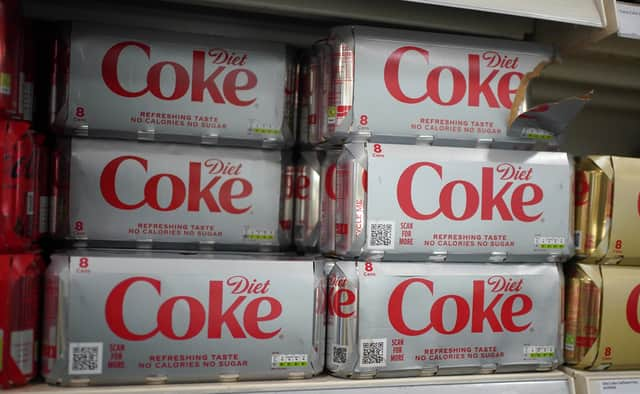Are diet drinks bad for you: What is aspartame, can it cause cancer, and what have the WHO said about it?


The International Agency for Research on Cancer (IARC) is reportedly set to make an announcement in July that aspartame - an artificial sweetener used in thousands of products - is “possibly carcinogenic to humans”.
This would mean that there is some evidence linking aspartame to cancer, but that is limited and the exact extent is still unknown.
Advertisement
Hide AdAdvertisement
Hide AdFood and drink items containing the ingredient include diet fizzy drinks, ice cream and chewing gum.
Here's everything you need to know.
What is aspartame?
Aspartame is an artificial sweetener 200 times sweeter than normal sugar (sucrose) invented 1965 by American chemist James M. Schlatter while working for G.D. Searle & Company, now a subsidiary of Pfizer. It was submitted for approval as a food ingerdient in 1974 and approved by the US Food and Drink Administration in 1981. Brand names have included NutraSweet, Equal, and Canderel. Over its history it has been reviewed by over 100 governmental regulatory bodies, all of whom have found it safe to consume. Several clinical trials have found that it is effective in reducing calorie intake to help people lose weight.
Why are people worrying about aspartame now?
The World Health Organisation’s (WHO) International Agency for Research on Cancer (IARC) has been carrying out a safety review was conducted to assess whether or not aspartame is a potential hazard, based on all the published evidence.
The Joint Food and Agriculture Organisaton (FOA)/WHO Expert Committee on Food Additives (Jecfa), has also been reviewing aspartame use this year.
Both are set to report their findings on July 14, resulting in the WHO officially listing aspartame as “possibly carcinogenic to humans”.
Should I be worried?
It's been reported that the review does not take into account how much of a product a person can safely consume, while the IARC's status of items that are “possibly carcinogenic to humans” is the lowest possible warning - with “probably carcinogenic to humans” and “carcinogenic to humans” more serious.
Other items falling into the “possibly carcinogenic to humans” category include working overnight, consuming red meat, using mobile phones, aloe vera, diesel and pickled Asian vegetables. So, according to the IARC, using a mobile phone is as likely to cause cancer as ingesting aspartame.
Meanwhile, charity Cancer Research UK explicitly states that artificial sweeteners such as aspartame don’t cause cancer. .
What have the IARC said?
Advertisement
Hide AdAdvertisement
Hide AdThe IARC said in a statement: “The IARC has assessed the potential carcinogenic effect of aspartame (hazard identification). Following this, the joint FAO/WHO Expert Committee on Food Additives (Jecfa) will update its risk assessment exercise on aspartame, including the reviewing of the acceptable daily intake and dietary exposure assessment for aspartame. Aspartame has been widely used since the 1980s as a table-top sweetener, and in products such as diet fizzy drinks, chewing gum, breakfast cereals and cough drops."
What have the makers of aspartame and products using the ingredient said?
The International Sweeteners Association (ISA) said “no conclusions” could be drawn until both reports were released.
ISA secretary general Frances Hunt-Wood said: “IARC is not a food safety body. The World Health Organisation’s Joint FAO/WHO Expert Committee on Food Additives (Jecfa) is currently conducting a comprehensive food safety review of aspartame and no conclusions can be drawn until both reports are published. Aspartame is one of the most thoroughly researched ingredients in history, with over 90 food safety agencies across the globe declaring it is safe, including the European Food Safety Authority, which conducted the most comprehensive safety evaluation of aspartame to date.”
Kate Loatman, executive director of the International Council of Beverages Associations, added: “While it appears the IARC is now prepared to concede that aspartame presents no more of a hazard to consumers than using aloe vera, public health authorities should be deeply concerned that this leaked opinion contradicts decades of high-quality scientific evidence and could needlessly mislead consumers into consuming more sugar rather than choosing safe no- and low-sugar options – all on the basis of low-quality studies. Even the IARC agrees it is not the appropriate authority to undertake risk assessment based on actual consumption and that it ‘does not make health recommendations’. We remain confident in the safety of aspartame given the overwhelming weight of scientific evidence and positive safety determinations by food safety authorities in more than 90 countries around the world. We, therefore, welcome the broader, more comprehensive food safety review underway by the WHO and the UN Food and Agriculture Organisation Joint Expert Committee on Food Additives.”
What foods and drinks contain aspartame?
Most products that contain the words 'diet', 'low-calorie' or 'sugar-free' are likely to include aspartame - which will be included on the ingredients list.
They include diet drinks such as Diet Coke, diet diluting juice, reduced-sugar ketchup, frozen desserts including ice cream, breakfast cereals, sugar-free gum, energy bars are all known to contain the sweetener, vitamin gummies, cough drops, instant coffee, sugar-free coffee syrups and dairy-free milks.
Additional reporting: PA
Comments
Want to join the conversation? Please or to comment on this article.